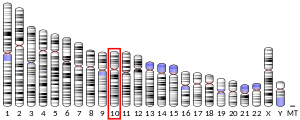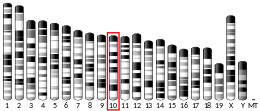RHOBTB1
Rho-related BTB domain-containing protein 1 is a protein that in humans is encoded by the RHOBTB1 gene.[5][6]
The protein encoded by this gene belongs to the Rho family of the Ras superfamily of small GTPases. It contains a GTPase domain, a proline-rich region, a tandem of 2 BTB (broad complex, tramtrack, and bric-a-brac) domains, and a conserved C-terminal region. The protein plays a role in small GTPase-mediated signal transduction and the organization of the actin filament system. Alternate transcriptional splice variants have been characterized.[6]
References
- GRCh38: Ensembl release 89: ENSG00000072422 - Ensembl, May 2017
- GRCm38: Ensembl release 89: ENSMUSG00000019944 - Ensembl, May 2017
- "Human PubMed Reference:". National Center for Biotechnology Information, U.S. National Library of Medicine.
- "Mouse PubMed Reference:". National Center for Biotechnology Information, U.S. National Library of Medicine.
- Rivero F, Dislich H, Glockner G, Noegel AA (Mar 2001). "The Dictyostelium discoideum family of Rho-related proteins". Nucleic Acids Res. 29 (5): 1068–79. doi:10.1093/nar/29.5.1068. PMC 29714. PMID 11222756.
- "Entrez Gene: RHOBTB1 Rho-related BTB domain containing 1".
Further reading
- Nagase T, Ishikawa K, Suyama M, et al. (1999). "Prediction of the coding sequences of unidentified human genes. XI. The complete sequences of 100 new cDNA clones from brain which code for large proteins in vitro". DNA Res. 5 (5): 277–86. doi:10.1093/dnares/5.5.277. PMID 9872452.
- Ramos S, Khademi F, Somesh BP, Rivero F (2003). "Genomic organization and expression profile of the small GTPases of the RhoBTB family in human and mouse". Gene. 298 (2): 147–57. doi:10.1016/S0378-1119(02)00980-0. PMID 12426103.
- Strausberg RL, Feingold EA, Grouse LH, et al. (2003). "Generation and initial analysis of more than 15,000 full-length human and mouse cDNA sequences". Proc. Natl. Acad. Sci. U.S.A. 99 (26): 16899–903. doi:10.1073/pnas.242603899. PMC 139241. PMID 12477932.
- Aspenström P, Fransson A, Saras J (2004). "Rho GTPases have diverse effects on the organization of the actin filament system". Biochem. J. 377 (Pt 2): 327–37. doi:10.1042/BJ20031041. PMC 1223866. PMID 14521508.
- Ota T, Suzuki Y, Nishikawa T, et al. (2004). "Complete sequencing and characterization of 21,243 full-length human cDNAs". Nat. Genet. 36 (1): 40–5. doi:10.1038/ng1285. PMID 14702039.
- Brandenberger R, Wei H, Zhang S, et al. (2005). "Transcriptome characterization elucidates signaling networks that control human ES cell growth and differentiation". Nat. Biotechnol. 22 (6): 707–16. doi:10.1038/nbt971. PMID 15146197.
- Gerhard DS, Wagner L, Feingold EA, et al. (2004). "The status, quality, and expansion of the NIH full-length cDNA project: the Mammalian Gene Collection (MGC)". Genome Res. 14 (10B): 2121–7. doi:10.1101/gr.2596504. PMC 528928. PMID 15489334.
- Beder LB, Gunduz M, Ouchida M, et al. (2006). "Identification of a candidate tumor suppressor gene RHOBTB1 located at a novel allelic loss region 10q21 in head and neck cancer" (PDF). J. Cancer Res. Clin. Oncol. 132 (1): 19–27. doi:10.1007/s00432-005-0033-0. PMID 16170569.
This article is issued from Wikipedia. The text is licensed under Creative Commons - Attribution - Sharealike. Additional terms may apply for the media files.




